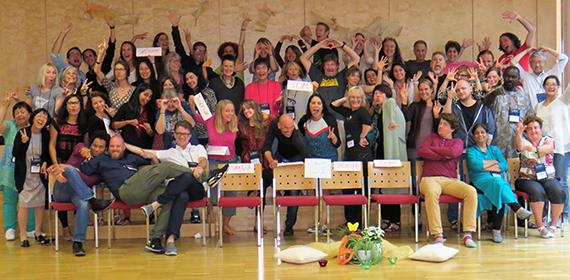
With peace makers from around the world at the International Institute on Peace Education conference in Innsbruck, Austria
By d’Arcy Lunn, 2016-18 Rotary Peace Fellow, International Christian University, Tokyo
Take visiting 15 countries over five months, then add in any number of training events, an internship, research, attending conferences and events, and meeting two Nobel Peace Laureates, and you get an amazing formula for gaining skills in peace building. The final and most important result of this equation, though, will be what I eventually do with it all. I have some ideas about that.
d’Arcy, left, with Nobel Peace Laureate Leymah Gbowee and former Rotary Peace Fellow Wisdom Addo at a PeaceJam event in Liberia.
The Rotary Peace Fellowship is a wonderful opportunity to earn a Master’s in Peace Studies at an esteemed university. With it comes an Applied Field Experience (AFE) where Fellows spend time almost anywhere in the world learning about peace with practitioners, academics, and others associated with peace in various ways.
The variety of Peace Fellows is as diverse as the applied field experience opportunities. In my class there was a Fellow from Bangladesh pursuing his field experience in Geneva, a Fellow from Sierra Leone and Gambia in Nigeria, from Argentina in Bolivia, Australia in Israel, and from the United Kingdom in Tanzania and Thailand.
I am originally from Australia, but have been fortunate to have had the opportunity to travel for the better part of the last 17 years. So I used the five-month applied field experience to see and experience as much as possible during a round-the-world trip that began in Japan and included North America, Europe, West Africa, the Middle East, and Southeast Asia.
During my field experience, my focus shifted from researching the way people perceive peace in different contexts (conflict, non-conflict, and post-conflict) to engaging in dialogues for reconciliation during an internship with Search for Common Ground in Liberia. I also took part in conferences centered on engaging youth in peace and educating people about peace.
I was not the most comfortable in the traditional classroom setting but out in the field my understanding flourished alongside highly engaging and effective educators, practitioners, and ambassadors for peace. The opportunity still seems like a dream.
A few of the very many highlights include:
- Taking part in two conferences in the mountains of Switzerland, one on preventing violent extremism and the other on the inclusion of children in decision making and peace processes at the Caux Peace Forum
- Learning and growing as a proponent of peace with a dynamic and enriching network of 100 peace educators in Austria
- Receiving over 250 responses from dozens of countries around the world to my online survey about people’s perceptions on the culture of peace. Add your voice
- Interviewing over 10 inspirational peace professionals and practitioners on their theories of change
- Supporting a program to establish community dialogue for reconciliation in Liberia on converting the temporary peace following their civil unrest to long-term peace and prosperity
- Working with Rotarians in Jordan to connect UNICEF, WHO, and Rotary with a school for polio eradication advocacy and engagement in proactive peace
- A few unexpected opportunities also came up as part of my field experience:
- Being an observer for the first round of elections in Liberia, a fascinating and hands-on look at their democracy leading up to, during, and after the election
- Meeting two Nobel Peace Laureates, Leymah Gbowee from Liberia and Jose Ramos Horta from Timor Leste, and hearing their stories of courage and advocating for peace. They have become role models to me.
- Taking part in two workshops at a youth peace conference in Liberia and Singapore with PeaceJam, bringing together local youth and Nobel Peace Laureates
I’m humbled and grateful, and come out of this experience with a high resolve to make peace an active and important component of my life and future. I hope to polish and refine all the small lessons and insights I have learned to create Teaspoons of Peace – small but significant choices, decisions, and actions creating more peace in the world.
I couldn’t have imagined a better opportunity than my applied field experience to engage, learn, and grow in my understanding and practice of peace. Thank you Rotary.